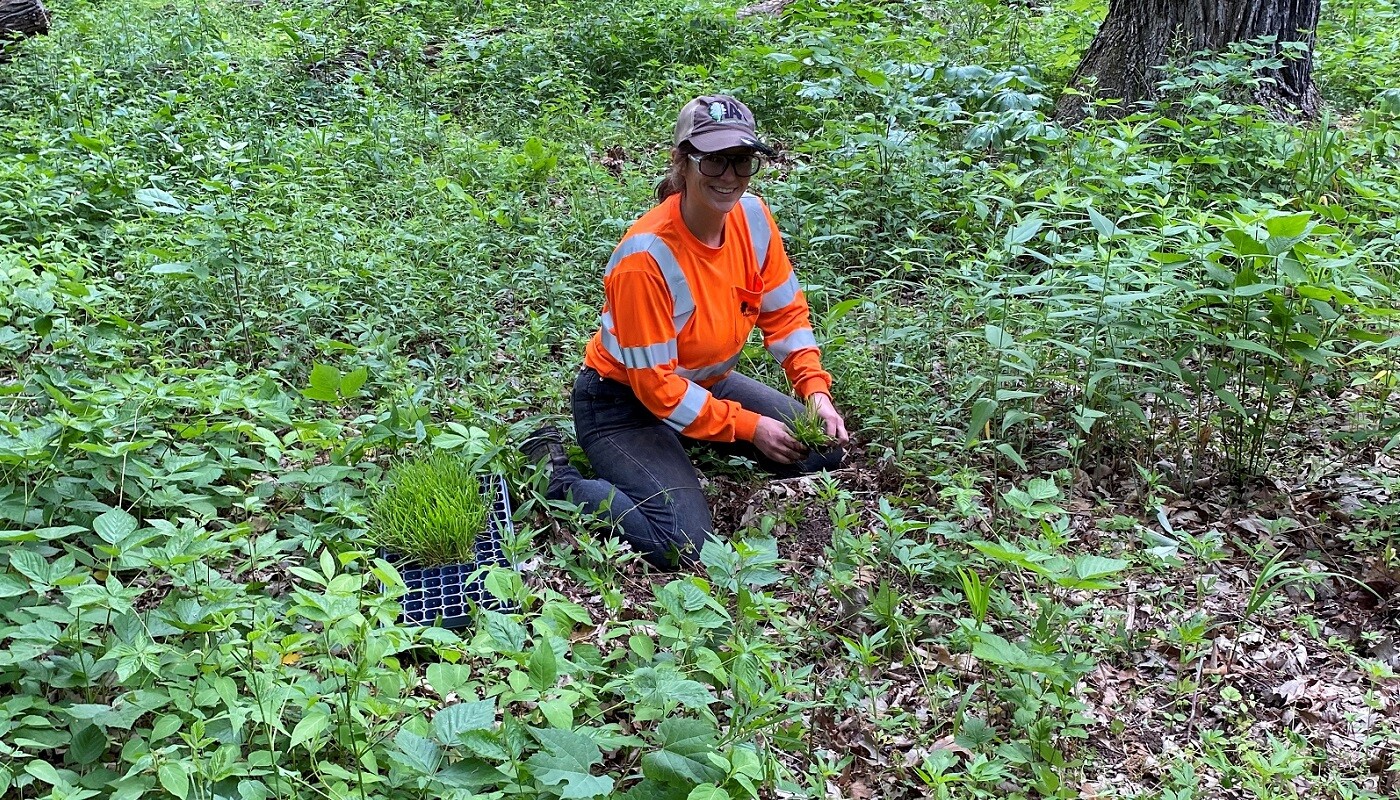A new era has begun! The Forest Preserves of Cook County has started investing the increased revenue available thanks to the approval of the referendum on the ballot last fall. The vast majority of new and improved programs, initiatives and amenities are still to come. But improvements that would not be happening without these extra resources are already having an impact—here are the highlights so far for 2023.
Ecological restoration
More than $300,000 of additional ecological restoration work has been completed at priority sites like Sauk Trail Woods, Jurgensen Woods and Busse Woods. Another $600,000 is committed and planned in the upcoming months for clearing and prescribed fire on more than 2,800 acres at Orland Grassland, Deer Grove, Country Lane Woods and other preserves.
We’ve expanded staff by adding 10 resource management crew aides—seven of which are graduates of our Conservation Corps programs—as well as a wildlife field laboratory technician and assistant resource project manager. These new staff will help the Forest Preserves address storm damage and invasive pests, increase capacity for trail management, and expand Conservation Corps programs. We have invested more than $1 million to date in new resource management equipment, as well, including trailers, chippers, skid steers, utility vehicles and track loaders.
More native plants are growing in the preserves thanks to the referendum funding. We planted 130 trees this spring, primarily in the North Branch region, with another round scheduled for the fall. We’ve expanded a seed bank and propagation partnership with the Chicago Botanic Garden and are creating an in-house seed nursery for native plants. Plug planting has already begun to increase biodiversity in Spears Woods.
Public Engagement
We’ve hired four laborers at Nature Centers, opening up the schedules of the naturalist staff to concentrate on engagement activities. This summer that has included hosting Hyde Park Neighborhood Club summer camp field trips at nature centers; kayaking, fishing, archery and environmental education for a camp focused on health and wellness hosted by the Calumet City Park District; and an expanded partnership with the Summit School District for teacher training and cultural programming.
A new full-time administrator has created similar opportunities for programming teams that run events in preserves across the County. They are now partnering with local groups to add programs in yoga, paddling, African and Irish dance performances, accessible activities for people with disabilities, forest bathing and more.
We’ve purchased canoe and kayak equipment for paddlers and helmets for biking events, and increased funding for the Nature Express Bus Program, which provides free transportation to Forest Preserves events for community groups.
We have doubled the annual advertising budget for summer and fall outreach to encourage people to visit and enjoy the preserves. Approximately a third of this marketing is dedicated to media that primarily reaches BIPOC audiences, with another third geographically targeted to economically disconnected areas.
A pilot program, the Beaubien Woods Youth Outdoor Ambassador Program, now has funding to be ongoing. Ten youth from communities on the South Side of Chicago work at the local preserve in a paid internship with a focus on restoration, trail work and sharing the story of the African American Water Trail, which starts at the Beaubien Woods Boat Launch.
Public Amenities
More than $3.5 million in contracts are in place for repairs on the Salt Creek and North Branch paved trails, beginning this summer, and on five unpaved trail systems launching this fall. Picnic shelter repairs for more than 30 shelters—from fresh paint to roof and other structural repairs—will also begin in the fall. This winter, a three-year initiative for major renovations of restrooms at as many as 60 of our buildings starts at Busse Woods and Dan Ryan Woods. And we have begun the feasibility studies for accessibility upgrades at nine canoe and kayak launches.
We’re replacing and updating tools and equipment to improve landscape maintenance. We’ve purchased new stand-in blowers and hot water pressure washers, and we’re in process to add wide-area mowers to replace some that are more than 30 years old, as well as electric weed whackers and leaf blowers.
A waste removal modernization plan has started, replacing the old metal garbage cans with new larger carts that won’t rust, have a lid to keep animals out and garbage in, and can be emptied more efficiently. Most locations will have additional recycling containers, as well. We have a dozen or so of the new carts in the field now as a pilot and have purchased two of the four trucks we’ll use to handle these containers. By this fall we’ll have six to seven hundred carts out in the Central Region, with further roll-out coming across the preserves.

